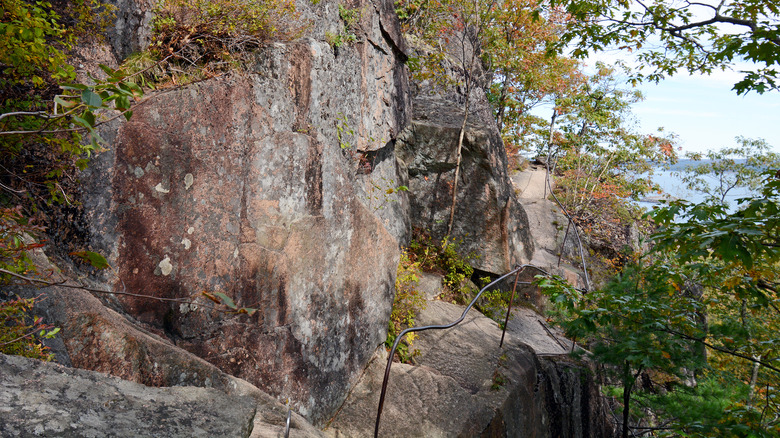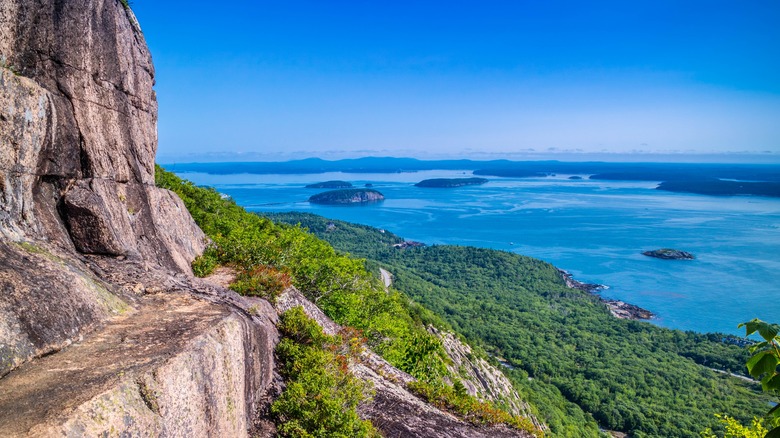Travel Guides Outdoor Adventures Hiking
Matt Berry
With a name like “Precipice” Trail, you can imagine that the popular Acadia National Park trail isn’t a leisure stroll through the meadows. As the name suggests (informs), Precipice Trail is probably the national park’s most strenuous and dangerous hike in the park. However, for the experienced and brave hiker, it may be the most rewarding in Acadia.
And we should repeat “experienced,” as the hike isn’t safe for novice hikers. People have been significantly injured and killed on this hike. In fact, Business Insider listed Precipice Trail as among the top “14 most dangerous attractions around the world,” and we’d like to disclaim that hikers should carefully self-assess their abilities when considering this infamous hike.
That said, hikers who do complete Precipice Trail are rewarded with sweeping mountain and ocean views from the summit of Champlain Mountain. If you’re an experienced and determined hiker (without a fear of heights), here’s what you can expect when hiking the “Precipice.”
The hike is actually mostly a climb

Cory Seamer/Shutterstock
When we say “hike” or “trail,” we should clarify that Precipice Trail’s difficulty is largely due to the climbing involved. While the trail is under a mile, you’ll experience over 1,000 feet of elevation gain. For the majority of the trail, the “hike” is closer to rock climbing without the assistance of ropes or harnesses. In fact, the National Park Service actually describes the trail as a “rugged, non-technical climb.”
To help would-be hikers assess if the trail’s appropriate for their abilities, Precipice Trail begins with a boulder outcropping with two pretty hard-to-reach iron rungs to use for scrambling over the obstacle. After this, you’ll spend the next half-mile or so scrambling over additional boulder fields before following a ledge system to begin your ascension up the cliff.
After the first leg of the hike, you’ll start your non-technical climb. To assist you, the trail features numerous iron rung ladders that zigzag through the cliff shelves and faults. After some pretty intense climbing, you’ll come across a narrow catwalk toward the top of a sheer cliff face. Fortunately, this precarious walk features nerve-easing handrails and iron rungs on the ground. After this bend, it’s a fairly straightforward uphill hike to reach the summit.
Getting back down is a lot easier

Vlad G/Shutterstock
Once you reach the summit of Champlain Mountain, you’ll be rewarded for your bravery and sweat with expansive views of Bar Harbor and Dorr Mountain to the west. While it’s possible to hike back down Precipice Trail, the National Park Service describes descending the trail as “dangerous and not advised.” It’s not only dangerous for you, but two-way traffic at certain points of the trail could also make it a dangerous decision for others.
Instead, we highly recommend that you descend on the North Ridge Trail, which is a moderately steep decline on loose granite, to the Orange and Black Path. While the North Ridge Trail is easy compared to your ascent, the Orange and Black Trail does involve climbing up and down granite steps before you reach the base of the Precipice Trail. The entire loop is around 2.6 miles and generally takes 3-5 hours to complete. While Precipice Trail isn’t for the faint-hearted (or inexperienced), the hike is certainly one of the most exhilarating experiences you can have in Acadia National Park.

